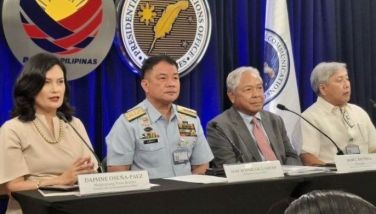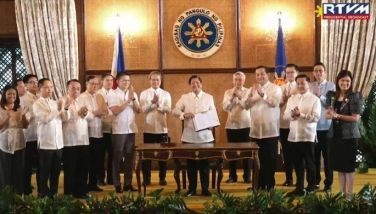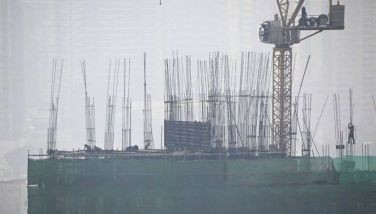First working day

LOS ANGELES – After a great holiday season of reconnecting with family and friends, it has got to be one of most difficult starts of the working week, indeed of the working year. By the time this column sees print, I will probably be somewhere above the Pacific Ocean on my way home. All that recharging of our batteries should come to good use as we start facing the challenges of 2010.
I don’t know what the manghuhulas are saying about this New Year but for us in the Philippines, it is a watershed year. It is a turning point year as we prepare to undertake our first computerized elections amidst the dangers posed by a regime that seems determined to stay on. Using computers to vote is a big challenge in itself. Trying to do it amidst the usual threats to the integrity of our elections should make us all want to make sure that it works and not be used as an excuse for the current powers to stay in power. Failure of elections is a real threat to our country staying in the pits.
Nothing rankles the political waters more than the prices of two basic commodities: rice and oil. As we entered the New Year, we face problems with both. As early as the third quarter last year, Agriculture Secretary Art Yap warned of supply shortages which justified his going into the international rice market early. The large quantities he sought started making the prices quoted rise. Being the largest world importer of rice, we always move the market when we ask for tenders.
As for oil, USA Today reports oil prices ended 2009 with a bang, surging about $10 a barrel to $79.36 or just about $80 a barrel in the final two weeks. Lower inventories in the US as well as a cold winter were cited among the reasons for the price jump. Crude is now 71 percent more expensive than it was at the beginning of the year. It hasn’t traded for $80 a barrel since Nov. 11.
Prices have rallied since March, USA Today recalls, moving opposite the dollar. Oil is priced in dollars, and when the dollar slumped this year, crude contracts became easier to buy for investors with foreign money. Investors also pumped money into energy commodities as a hedge against inflation.
“Oil got an additional boost in December as temperatures dropped and homeowners cranked up the heat. The country’s oil stockpile, which ballooned in May to the highest level since 1990, shrank this month by 10.1 million barrels. Oil prices perked up in response, and they pulled pump prices higher as well.”
It is important for our politicians to approach the expected price rises in these two basic commodities with as much rationality as they can muster. Of course I know this is wishful thinking in the light of the political season. But I was just thinking that it will not serve the public interest for politicians to feed more anger into the public consciousness over something that we can do nothing about in the short term.
Indeed, it would be better for politicians to offer good long-term strategies to address these usual problems in their platforms. I have yet to see a good energy strategy, one that I can respect, from any of the candidates. I also have to see a good long-term strategy to our rice and agriculture policies from any of them. I hope those who get the opportunity to ask questions in the many public for the presidential contest will seek to get the answers and not be content with the usual platitudes these candidates dish out.
The health of the economy should be uppermost in our minds in 2010. Yes, we are not about to go into another Great Depression but the economic environment promises to be challenging. All eyes will still be focused on the big economies particularly the United States. They seem to be getting out of it, but the signals are still mixed and they still have to make sure things really improve as many are now hopefully predicting.
The challenge here in the US is also politics. This is an election year, the first opportunity for the American electorate to evaluate the initial performance of President Obama. Surveys still show the American public trusts him more than any other politician today but his ratings have suffered quite a bit as a result of the high unemployment rate and the lack of real relief for distressed homeowners.
Some of the so-called priorities for which Americans voted for Mr. Obama have fallen on the wayside as the financial crisis deepened. Here in California, the school system is a major victim of financial woes. Thousands of teachers have been laid off forcing school districts to increase class sizes. Young freshly trained teachers with expertise in handling computerizes classrooms are being thrown out in favor of longer tenured teachers with little or no inclination to use computers. This is not the formula for making America competitive in the long term. Mr. Obama may have promised to lift the quality of American elementary and secondary education from its current pits but the budgetary problems of major states like California is making him look like someone who talks big dreams but can’t deliver on promises.
From what I have seen on the ground in this state, things are still pretty bad. I hope the American electorate will not take this out on Mr. Obama and the Democrats in the November election. After all, they did inherit a pretty dismal economy from the Republicans and it takes a long while to correct the consequences of eight years of mistakes that the Republicans have caused on the economy.
It doesn’t help that Mr. Obama is not getting any help from a highly partisan Republican party in Congress to get his programs through. But Mr. Obama must show tougher leadership. His conciliatory approach is simply not working. In the end, Americans and the world look up to him for effective leadership. The health of our own economies also depends on him doing what he should.
For us, I could sense a turnaround in our economic sentiments this year. In the short term up to June, our political risk may increase somewhat with cha cha or failure of our automated elections very much in the air. But if we are able to carry out our first computerized election in a clean and credible manner and effect a change of government, expect investor confidence to soar.
For now, I just want to wish all our readers a very Prosperous New Year! We deserve it… after all these years!
New drug
Robin Tong contributed this one.
Pfizer has decided to sponsor Tiger Woods.
They are making a new drug called Tiagra.
It’s good for 18 holes.
Boo Chanco’s e-mail address is [email protected].
- Latest
- Trending






























